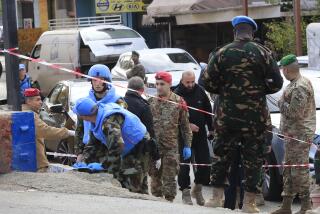Ulster Land Mine Kills 7 Soldiers, Injures 29 : Bus Carrying British Troops Wrecked; No One Claims Responsibility, but IRA Is Suspected
- Share via
BELFAST, Northern Ireland — Seven British soldiers were killed and 29 others were injured early today when a bus carrying troops was destroyed by a land mine, police said.
The military bus, which bore no markings, was taking 38 soldiers from Aldegrove airport, near Belfast, to their barracks at Omagh, about 50 miles away, following their leaves in England, according to a spokesman at the British Army’s headquarters at Lisburn near Belfast. The vehicle detonated the mine 9 miles from the soldiers’ barracks, on the road between Omagh and Ballygawley in County Tyrone.
Paddy Bogan, president of Northern Ireland’s centrist Alliance Party, who lives near the scene of the blast, described the attack as “a terrible slaughter.”
‘Mess of Mangled Metal’
Bogan, who went to the scene with other local people, said: “The bus was a mess of mangled metal. It was a miracle anyone got out of it alive. The faces of the injured were terribly cut and bleeding.”
No one claimed responsibility, but police suspected guerrillas of the outlawed Irish Republican Army. The army spokesman spoke on condition of anonymity, in keeping with British practice.
Police and army units rushed in to seal off the area and search for the killers, while ambulances took the casualties to Tyrone County Hospital.
The predominantly Roman Catholic IRA is fighting to drive the British out of Northern Ireland, or Ulster, where Protestants outnumber Catholics 3-2, and unite it with the Catholic Irish Republic.
Police blamed IRA guerrillas for two other bombings Friday. One injured three police officers and the other damaged the province’s newest luxury hotel.
Also on Friday, funerals were held for a British soldier IRA guerrillas killed last week in Belgium and for a Protestant grocer shot to death Wednesday in his Belfast store.
Answering Alarm
The three police officers were wounded when they responded to a ringing burglary alarm early Friday at a gas station in Lisnaskea, 62 miles west of Belfast. Officials said one of the officers, a 26-year-old woman, lost an eye and remained hospitalized. Her two male colleagues were treated for cuts and released.
Guests and staff of the Mourne Country Hotel in Newry were evacuated at 2:30 a.m. after three warning calls to a Newry hospital and the Samaritans charity organization, police said.
A car bomb exploded outside minutes later, causing extensive damage to the hotel’s kitchen area but no casualties.
“There was only a few guests. We were lucky in that,” said an employee, who spoke with the condition he not be identified.
An IRA message to a Belfast radio station called the hotel near the border with the Irish republic “a meeting place for members of the security forces and informers” and claimed responsibility for that bombing and the one in Lisnaskea.
In Knighton, Wales, more than 1,000 mourners attended the funeral of Warrant Officer 1st Class Richard Michael Heakin, 38, who was killed by IRA gunmen Aug. 12 in the Belgian port of Ostend as he stopped his car for a traffic light.
He was stationed in West Germany but his license plate identified him as a British soldier.
At the parish church of St. Edward, his cousin, the Rev. Leo Heakin, prayed that “the forces of evil and terrorism will never ever have the last word in our world and that peace and justice will prevail.”
In Belfast, thousands of people lined the streets to observe a funeral procession for Frederick Otley, 44, the grocer shot to death by masked gunmen Wednesday in his shop in the Protestant Shankill Road area of west Belfast.
The Irish Revolutionary Brigade, a previously unknown group, claimed responsibility Wednesday. On Friday, the Irish National Liberation Army asserted responsibility and claimed Otley belonged to the Ulster Volunteer Force, a Protestant paramilitary organization.
In June, six British soldiers were killed on return from a race for charity in the army garrison town of Lisburn, just south of Belfast. The IRA later said it had planted a bomb under the soldiers’ van. It was the group’s bloodiest attack on the British army in Northern Ireland in nearly a decade.
More to Read
Sign up for Essential California
The most important California stories and recommendations in your inbox every morning.
You may occasionally receive promotional content from the Los Angeles Times.













